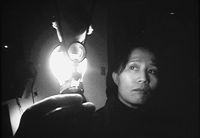
|
 |
2H
|
JAPAN
/ 1999 / Chinese, Japanese / Color, B&W / 35mm (1: 1.37) / 120
min
Director, Photography, Editing, Sound: Li Ying
Producer: Zhang Yi
Camera Assistance: Kawamura Atsushi
Recording Assistance: Iizuka Teizo, Utsumi Hiroyoshi
Production Cooperation: TSP Inc., IMAGICA corp
Production Company, Source: Dragon Films Inc.
25th Kyutei Bldg. 805,
3-13-22 Sendagaya, Shibuya-ku, Tokyo 150-0051, JAPAN
Phone: 81-3-3405-7888 / Fax: 81-3-3405-7887
E-mail: info@dragonfilmsinc.com

|
|
Li Ying
Born in China in 1963. He started working on documentary films as
a director at China Central Television (CCTV) in 1984. Came to Japan
in 1989 and carried out research on principles of visual anthropology
from 1991 to 1993. Since 1993, he has studied Japanese film as an
Overseas Guest Artist-Researcher at Japan' s Agency for Cultural Affairs
on the recommendation of the Directors Guild of Japan. He founded
Dragon Films Inc. for TV and film production. 2H is his first feature-length film. 
|
The film unfolds around the lives of two Chinese people in Tokyo:
Ma, an old man who has lived the history of modern China, and Xiong,
a woman and an artist. Each scene is monochromatically dyed; the old
man appears in black and white, and Xiong appears in somber red. This
contrast is structural. But the relationships between people, like
fin-de-si³cle Tokyo itself are hopeless. The film crew is standing
by in advance, near the old man and Xiong. A lot of time must have
been spent waiting for the shoot to begin, but an explanation is omitted.
What we are able to see (that is, after an agreement with the film
crew has been reached), are such things as a conversation between
the old man and Xiong revolving around pregnancy, Xiong's relationship
with a man, a meal taken by the old man and a maid, a quarrel and
so on. The person filmming asks the old man, "Don't you want
to leave proof of having lived?," but the old man doesn't answer.
Afterward we are told the old man died alone. The corpse is borne
by relatives from an upper floor of the apartment and, as it is slowly
carried out, a musical accompaniment plays as if to send the old man
off. The film depicts with a firm will the lives (and deaths) of Chinese
living in Tokyo at the end of the century. Though the film is difficult
to label, as the story is quietly offered up, various scenes of what
has taken place flash by and make us feel a powerful affection for
the film's characters, especially old Ma. Documentary film is a box
that can seal up and release reality. [Takahashi Sunao]
Director's
Statement
The passage from life to death is also a process of the climax of
one's existence. All of one's vain hopes, conflicts, battles, victories
and defeats, compromises, isolation and prayers send out overwhelming
signals at the culminating stage of an individual's life. For me,
the process of shooting this film was one of interacting with and
pursuing these signals.
Perhaps when I respond to "life and death" I am reacting
to the emerging signs of the collapse of nation, the family, and personal
relationships at the end of the 20th century. In this sense, I conceive
of this film as a fin-de-siécle work for the present century.
In order to reveal that sentiment, I tried to break down the "Berlin
Wall" of conventions that stands between fiction and non-fiction
in films. With a digital video camera, the image making experiment
of the new era, I try to touch an "isolation of 100 years"
in its naked fullness.
|
  |
|
before  next next |
COPYRIGHT:Yamagata International Documentary Film Festival Organizing Committee |